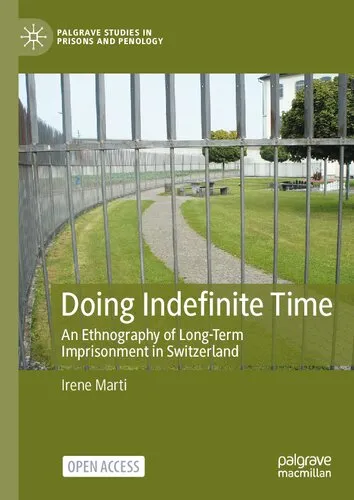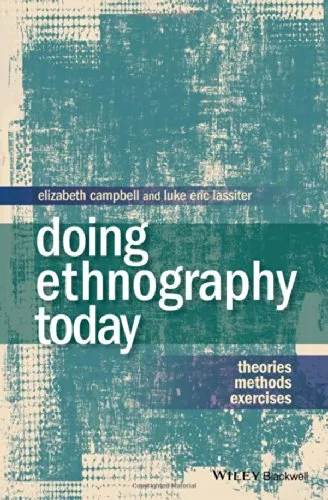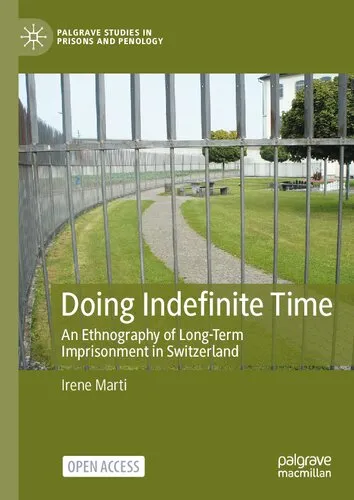Doing Indefinite Time: An Ethnography of Long-Term Imprisonment in Switzerland
4.0
Reviews from our users

You Can Ask your questions from this book's AI after Login
Each download or ask from book AI costs 2 points. To earn more free points, please visit the Points Guide Page and complete some valuable actions.Related Refrences:
Introduction to Doing Indefinite Time: An Ethnography of Long-Term Imprisonment in Switzerland
Doing Indefinite Time: An Ethnography of Long-Term Imprisonment in Switzerland, authored by Irene Marti, delves into the deeply complex and often opaque world of long-term incarceration. Through this ethnographic study, the book offers a profound exploration of how individuals in Swiss prisons navigate the challenges of serving indefinite sentences, cope with the constraints of penal life, and construct meaning under the weight of time that seems, paradoxically, both vast and suspended. By focusing on the Swiss penitentiary system—a system often portrayed as humane compared to others—the book unpacks layers of emotional, social, and institutional realities that encapsulate those behind bars. The work bridges academic rigor with humanistic storytelling, challenging readers to question and rethink their understanding of punishment, rehabilitation, and justice.
By embedding herself within prison environments and engaging deeply with inmates' lived experiences, Marti sheds light on a population whose stories are often marginalized or reduced to simplistic portrayals. This ethnography is not merely an academic study, but a humanizing effort to understand the emotional toll and existential crises associated with incarceration. While framed within the Swiss context, the broader implications of the book resonate across jurisdictions, making it essential reading for scholars, policy-makers, and anyone grappling with questions relating to the penal system.
Detailed Summary of the Book
The book takes readers on a profound journey into the lives of long-term prisoners in Switzerland, a country renowned for its progressive approach to criminal justice. Irene Marti examines the experiences of individuals serving indefinite incarceration, where release often hinges on institutional discretion rather than fixed terms. Through direct observation, in-depth interviews, and access to the daily rhythm of prison life, the ethnography highlights the psychological burden of temporal uncertainty imposed upon prisoners.
Marti explores themes such as personal agency (or lack thereof), the loss of autonomy, emotional isolation, strategies for coping with the monotony of prison life, and the ethics of indefinite detention. Despite Switzerland's aspirations for rehabilitation-oriented penal practices, the prisoners' stories reveal the inherent difficulties in achieving personal growth and making life meaningful under conditions of extended confinement. The combination of empirical research and thematic analysis makes this a deeply impactful narrative that bridges sociology, criminology, and human rights discussions.
Moreover, the book calls into question the distinctions between retribution and rehabilitation, documenting how these ideologies clash in practice. Ultimately, Marti provides a platform for the voices of those whose lives are suspended in the liminal space between incarceration and the ever-elusive promise of reintegration into society.
Key Takeaways
- Indefinite imprisonment creates unique psychological and emotional challenges that differ markedly from fixed-term sentencing.
- The Swiss prison system, despite its emphasis on rehabilitation, struggles with ethical dilemmas surrounding the practice of indefinite detention.
- Prisoners develop resilience and coping mechanisms to deal with temporal uncertainty, but these strategies come at a significant personal cost.
- Long-term imprisonment underscores the delicate balance between rehabilitation and punishment, highlighting systemic inconsistencies in the justice system.
- Humanizing the lived experiences of marginalized populations, such as inmates, is critical for broader discussions about justice and human rights.
Famous Quotes from the Book
"The weight of time in prison is not measured by the ticking of seconds but by the intangible sense of a life put on pause."
"To live in an indefinite temporal horizon is not merely to endure confinement, but to wrestle with the disquieting uncertainty of not knowing when—if ever—it will end."
"In the Swiss penal context, the tension between institutional ideals of rehabilitation and the punitive realities of incarceration becomes a paradox too significant to ignore."
Why This Book Matters
Doing Indefinite Time breaks new ground by addressing a critical but underexplored aspect of incarceration: the experiences of those serving indefinite sentences. The book intersects ethnography with broader societal and ethical debates, offering readers insights into the lives of individuals often silenced within public conversations about crime and punishment.
This work is particularly impactful in shedding light on the gap between the ideals of rehabilitation and the lived realities of incarceration. It places the human experience at the forefront, challenging readers to connect emotionally and intellectually with the dilemmas prisoners face. Furthermore, the Swiss context provides an opportunity to critically examine a penal system considered progressive and to assess whether those reforms truly deliver justice and dignity for all.
By addressing themes such as institutional power, personal agency, and the moral responsibility of societies to balance justice with humanity, this book contributes meaningfully to global discussions on incarceration systems. For policymakers, scholars, and human rights advocates, Doing Indefinite Time is a valuable resource that sparks meaningful dialogue about reforming prison practices and upholding human dignity within the justice system.
Free Direct Download
You Can Download this book after Login
Accessing books through legal platforms and public libraries not only supports the rights of authors and publishers but also contributes to the sustainability of reading culture. Before downloading, please take a moment to consider these options.
Find this book on other platforms:
WorldCat helps you find books in libraries worldwide.
See ratings, reviews, and discussions on Goodreads.
Find and buy rare or used books on AbeBooks.
1377
بازدید4.0
امتیاز0
نظر98%
رضایتReviews:
4.0
Based on 0 users review
Questions & Answers
Ask questions about this book or help others by answering
No questions yet. Be the first to ask!













